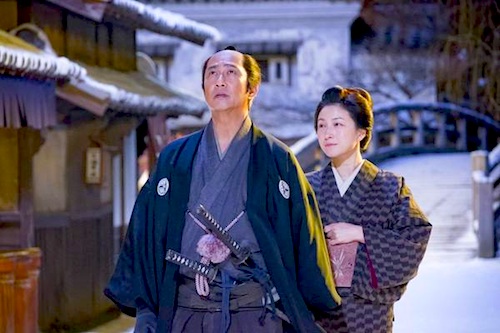By Joe Bendel. Kingo Shimura is sort of like a one-man 47 Ronin. He even references them himself. Unfortunately, Shimura outlived his times as well as his lord. The Edo Era is over, but Shimura’s disgrace continues in Setsuro Wakamatsu’s Snow on the Blades, which screened as a selection of this year’s Japan Cuts, the Festival of New Japanese Film in New York.
Lord Naosuke Ii was a high ranking Shogunate official, who was too moderate in his reformist and westernizing policies for some and too extreme for others. He cracked down on high ranking nobles who opposed him, but left plenty of disgruntled ronin at loose ends. In 1860, he really was assassinated during Sakuradamon Incident. That was exactly what Shimura was supposed to prevent as his recently appointed chief of security.
Disgraced by his failure, Shimura is forbidden from committing seppuku until he finds and decapitates at least one of the surviving assassins. Twelve of the ronin either performed seppuku there on the spot, or were accounted for shortly thereafter. That left five elusive assassins for Shimura to track. Unfortunately, as the years go by, the fugitives die off through subsequent misadventures. Eventually, the guilt-ridden Jyubei Sahashi is the only one still at large. However, formalized vengeance taking is banned during the Meiji Restoration.
Throughout all his tribulations and humiliations, Shimura’s wife Setsu loyally supports him. Similarly, Sahashi is guardedly devoted to the next-door widow and her young daughter, but he is incapable of committing to them, because he lives looking over his shoulder. It is exactly those human relationships that concern Snow more than hack-and-slash action.
Snow is a gloriously old fashioned tragedy, boasting genuine emotional depth and historical sweep. It also suggests a little bit of westernization is not a bad thing, while recognizing the value of tradition. In fact, that tension helps make Snow such a richly humanistic revisionist Jidaigeki film. Frankly, it is not hard to imagine Clint Eastwood remaking it as an early 20th century western.

As Shimura, Kiichi Nakai is appropriately both stately and hardnosed. Yet, he just knee-caps viewers in his tender scenes with Setsu, played with exquisite sensitivity and warmth, by Ryoko Hirosue. Hiroshi Abe (perhaps too closely associated with the Thermae Romae franchise) is severely reserved, yet expresses considerable angst and regret as the outlaw Sahashi. It is an impressive ensemble, especially including “Living Treasure” kabuki and screen actor Kichiemon Nakamura, making his return to film after a nineteen year hiatus as Lord Ii.
Everyone brought their A-game to Snow, including Joe Hisashi, who contributes one of his best non-Studio Ghibli scores. It is quite lovely, giving the film an acoustic vibe that is mournful but also hopeful. Sober and elegant, Snow on the Blades is a wonderfully satisfying film. Although the self-styled conflict-resolution industry is mostly bunky hokum, this really is a film that they could bury some hatchets with. Very highly recommended, its screened this past Tuesday (7/14) at the Japan Society, as part of the 2015 Japan Cuts.
LFM GRADE: A
Posted on July 16th, 2015 at 11:05pm.